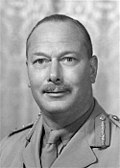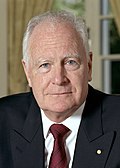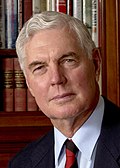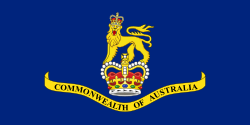| No. | Portrait | Name
(Birth–Death) | Term of office | Monarch
Reign | Prime Minister
Term of office | Ref. |
|---|
| Took office | Left office | Time in office |
|---|
| 1 |  | John Hope
7th Earl of Hopetoun
(1860–1908) | 1 January
1901 [a] | 17 July
1902 [b] | 1 year, 197 days | Victoria
(1837–1901) |
Edmund Barton
(1901–1903) | [6] |
Edward VII
(1901–1910) |
| 2 |  | Hallam Tennyson
2nd Baron Tennyson
(1852–1928) | 9 January
1903 | 21 January
1904 | 1 year, 12 days |
Alfred Deakin
(1903–1904) |
| 3 |  | Henry Northcote
1st Baron Northcote
(1846–1911) | 21 January
1904 | 9 September
1908 | 4 years, 232 days |
Chris Watson
(1904) |
George Reid
(1904–1905) |
Alfred Deakin
(1905–1908) |
| 4 |  | William Ward
2nd Earl of Dudley
(1867–1932) | 9 September
1908 | 31 July
1911 | 2 years, 325 days |
Andrew Fisher
(1908–1909) |
Alfred Deakin
(1909–1910) |
Andrew Fisher
(1910–1913) |
George V
(1910–1936) |
| 5 |  | Thomas Denman
3rd Baron Denman
(1874–1954) | 31 July
1911 | 18 May
1914 | 2 years, 291 days |
Joseph Cook
(1913–1914) |
| 6 |  | Sir Ronald Munro Ferguson
(1860–1934) | 18 May
1914 | 6 October
1920 | 6 years, 141 days |
Andrew Fisher
(1914–1915) |
Billy Hughes
(1915–1923) |
| 7 |  | Henry Forster
1st Baron Forster
(1866–1936) | 6 October
1920 | 8 October
1925 | 5 years, 2 days |
Stanley Bruce
(1923–1929) |
| 8 |  | John Baird
1st Baron Stonehaven
(1874–1941) | 8 October
1925 | 2 October
1930 [c] | 4 years, 359 days |
James Scullin
(1929–1932) |
| 9 |  | Sir Isaac Isaacs
(1855–1948) | 21 January
1931 | 23 January
1936 | 5 years, 2 days |
Joseph Lyons
(1932–1939) |
Edward VIII
(1936) |
| 10 |  | Brigadier-General
Alexander Hore-Ruthven
1st Baron Gowrie
(1872–1955) | 23 January
1936 | 30 January
1945 | 9 years, 7 days |
George VI
(1936–1952) |
Earle Page
(1939) |
Robert Menzies
(1939–1941) |
Arthur Fadden
(1941) |
John Curtin
(1941–1945) |
| 11 |  | Prince Henry
Duke of Gloucester
(1900–1974) | 30 January
1945 | 11 March
1947 | 2 years, 40 days |
Frank Forde
(1945) |
Ben Chifley
(1945–1949) |
| 12 |  | Sir William McKell
(1891–1985) | 11 March
1947 | 8 May
1953 | 6 years, 58 days |
Robert Menzies
(1949–1966) |
Elizabeth II
(1952–2022) |
| 13 |  | Field Marshal
Sir William Slim
(1891–1970) | 8 May
1953 | 2 February
1960 | 6 years, 270 days |
| 14 |  | William Morrison
1st Viscount Dunrossil
(1893–1961) | 2 February
1960 | 3 February
1961 [d] | 1 year, 1 day |
| 15 |  | William Sidney
1st Viscount De L'Isle
(1909–1991) | 3 August
1961 | 7 May
1965 | 3 years, 277 days |
| 16 |  | Richard Casey
Baron Casey
(1890–1976) | 7 May
1965 | 30 April
1969 | 3 years, 358 days |
Harold Holt
(1966–1967) |
John McEwen
(1967–1968) |
John Gorton
(1968–1971) |
| 17 |  | Sir Paul Hasluck
(1905–1993) | 30 April
1969 | 11 July
1974 | 5 years, 72 days |
William McMahon
(1971–1972) |
Gough Whitlam
(1972–1975) |
| 18 |  | Sir John Kerr
(1914–1991) | 11 July
1974 | 8 December
1977 | 3 years, 150 days |
Malcolm Fraser
(1975–1983) |
| 19 |  | Sir Zelman Cowen
(1919–2011) | 8 December
1977 | 29 July
1982 | 4 years, 233 days |
| 20 |  | Sir Ninian Stephen
(1923–2017) | 29 July
1982 | 16 February
1989 | 6 years, 202 days |
Bob Hawke
(1983–1991) |
| 21 |  | Bill Hayden
(1933–2023) | 16 February
1989 | 16 February
1996 | 7 years |
Paul Keating
(1991–1996) |
| 22 |  | Sir William Deane
(born 1931) | 16 February
1996 | 29 June
2001 | 5 years, 133 days |
John Howard
(1996–2007) |
| 23 |  | Peter Hollingworth
(born 1935) | 29 June
2001 | 28 May
2003 [e] | 1 year, 333 days |
| 24 |  | Major General
Michael Jeffery
(1937–2020) | 11 August
2003 | 5 September
2008 | 5 years, 25 days |
Kevin Rudd
(2007–2010) |
| 25 |  | Dame Quentin Bryce
(born 1942) | 5 September
2008 | 28 March
2014 | 5 years, 204 days |
Julia Gillard
(2010–2013) |
Kevin Rudd
(2013) |
Tony Abbott
(2013–2015) |
| 26 |  | General
Sir Peter Cosgrove
(born 1947) | 28 March
2014 | 1 July
2019 | 5 years, 95 days |
Malcolm Turnbull
(2015–2018) |
Scott Morrison
(2018–2022) |
| 27 |  | General
David Hurley
(born 1953) | 1 July
2019 | 1 July
2024 | 5 years |
Anthony Albanese
(since 2022) |
Charles III
(since 2022) |
| 28 |  | Sam Mostyn
(born 1965) | 1 July
2024 | Incumbent | 1 year, 120 days | [7] |



































